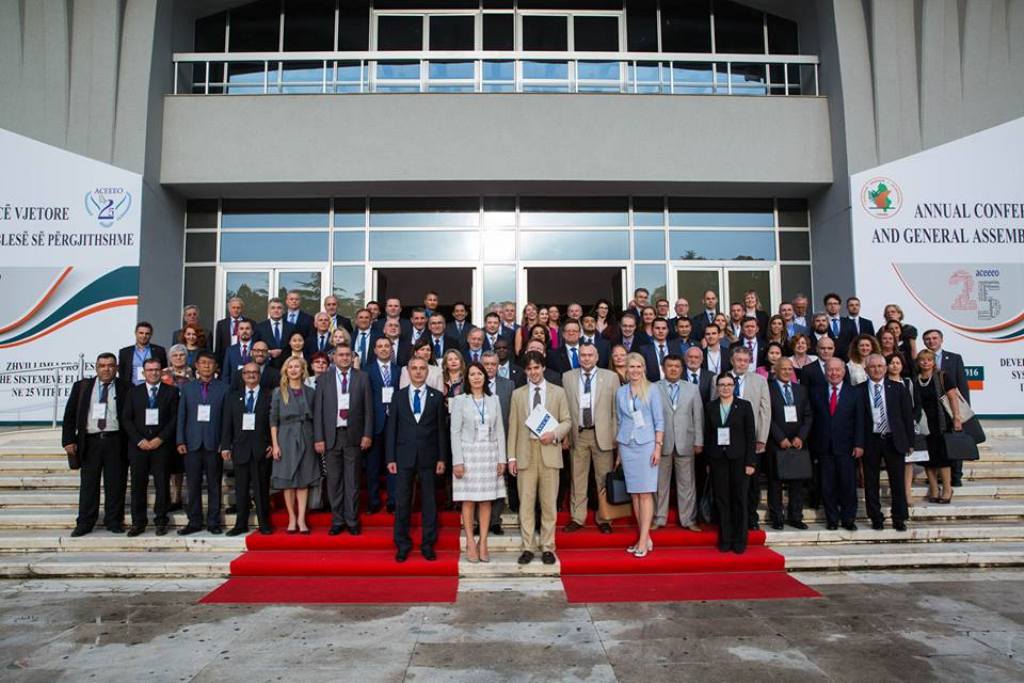
Tirana, September 21, 2016 NOA.al – The Association of European Election Officials will held its 25th Annual Conference on 21-23 September 2016 in Tirana, Albania.
The topic for this high-level meeting of EMBs is ‘Development of Electoral Systems and Processes in the last 25 years’.
It gives an opportunity to have an overview about the changes of electoral systems and processes in the last quarter-century, to present the main tendencies, best practices and problems and the way electoral management bodies dealt with them.
The ACEEEO was founded in Budapest, Hungary, with the collaboration of IFES in 1991. Seven former socialist countries were present on the first symposium where these countries (Albania, Bulgaria, Czechoslovakia, Hungary, Poland, Romania, and Yugoslavia) decided to set up the ACEEEO. Almost 25 years have passed since then, and by 2016, the ACEEEO counts 24 institutional members from the European region. In 2016 the organization celebrates its 25th anniversary.
The 25th Anniversary Conference, that is organized on 21-23 September, 2016 in Tirana by the Central Election Commission of Albania in cooperation with the Secretariat of the Association provides an opportunity to have an overview about the changes of electoral systems and processes in the last 25 years in the Central and Eastern European region, to present the main tendencies, best practices and problems, and the way electoral management bodies dealt with them. The concept of the conference is based on the book that will be published for the anniversary entitled ‘ACEEEO 25 – Development of Electoral Systems in Central and Eastern Europe since 1991’.
The presentations and the debates will focus on the tendencies, give a clear overview of the last 25 years, and explain the progress in four different fields of the electoral law that are the followings (the same as in the book).
Electoral systems
Electoral systems in the region have changed a lot in the last quarter century in the region. The first session of the conference will give a report on the most important developments of this field, presenting the different types of the electoral systems that are used in the parliamentary elections and presidential elections. It will deal also with the details as nomination system, boundary delimitation, voting methods, determination of election results, voter turnout requirements, duration of the mandate, election thresholds, surplus votes, etc.
Stability of election laws
It is worth to have an idea about how many times electoral legislation regulating the parliamentary and presidential elections was amended in our members’ countries since 1991. The date of this amendments (or adoption of totally new regulation) has also utmost importance: modification of the electoral law within one year prior to the elections should be avoided. Stability is a central requirement, however, in some cases the flexibility could be also necessary. We invited our speakers of the second session to introduce the backstage: the sources and the background of this changes and their reaction and tasks with the executing of these changes.
Electoral management bodies
ACEEEO has 24 institutional members, all are electoral management bodies. Most of them follow the independent model or the mixed model (with an electoral commission and an electoral office for the technical issues), just a minority has a governmental model. However, there are differences in the details, such as appointment of members, duration of mandate, termination of the mandate, participation of delegates of political parties, and even in the competences. The third session of the conference makes it possible to compare these models, find the advantages and disadvantages, strengths and risks.
Safeguards of free and fair elections
Procedural rules are the core of the electoral legislation because even the most perfect electoral systems are unable to function without a procedure that guarantees free and fair elections. In the fourth session of the conference, we focus on some of the most important safeguards of the procedure. The regulation of campaign activities, the access to campaign (e.g. prohibitions related to the placement of posters at certain public spaces, rules related to the broadcasting of political advertisements, etc.) are inevitable for ensuring the equality of chances of the different political forces. Legal remedies that can be initiated by the citizens, political parties and candidates make it possible to eliminate any illegal actions during the procedure. Transparency of the process is also a guarantee that can defend the integrity of the election. /noa.al/
AGENDA






